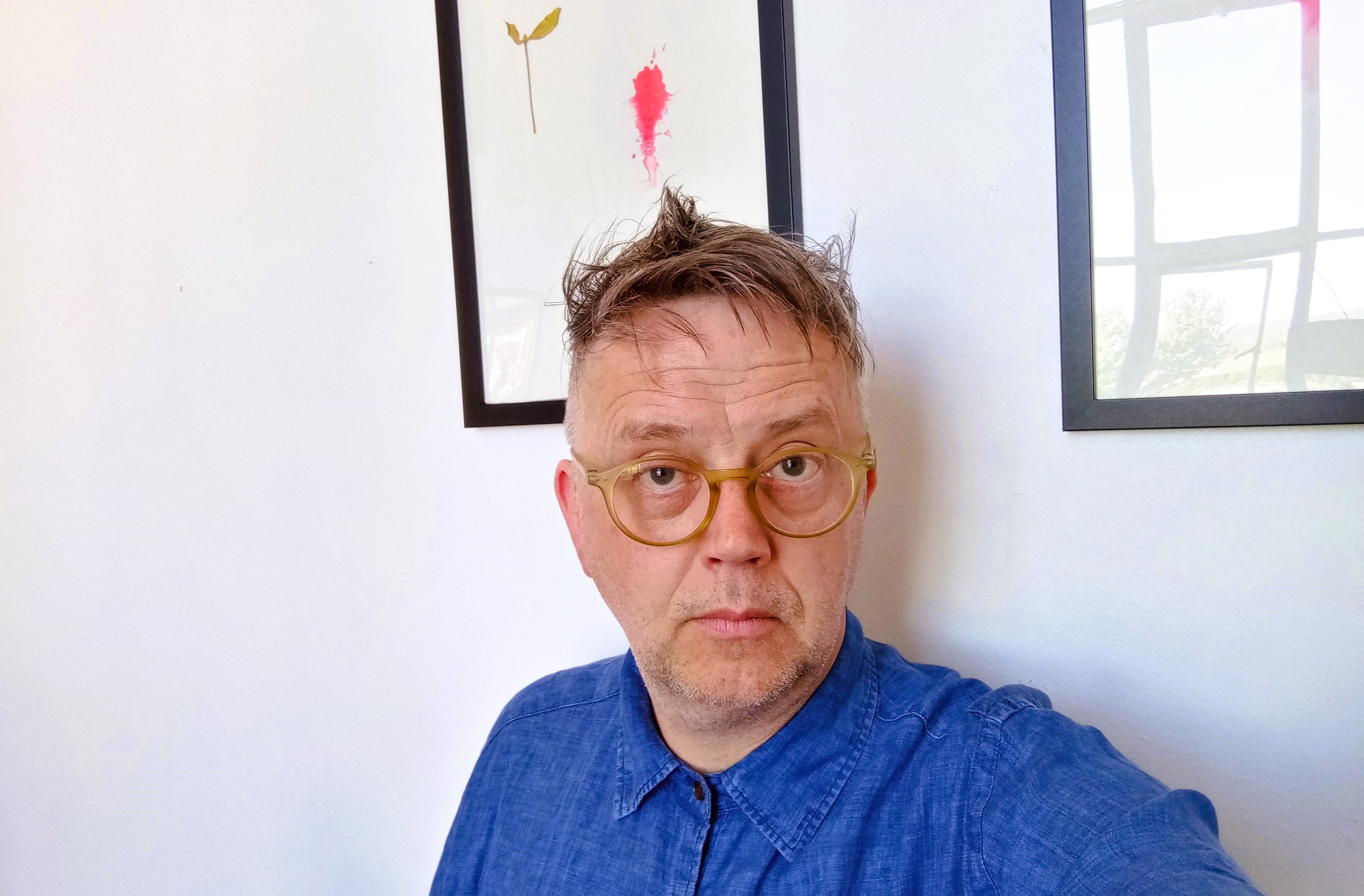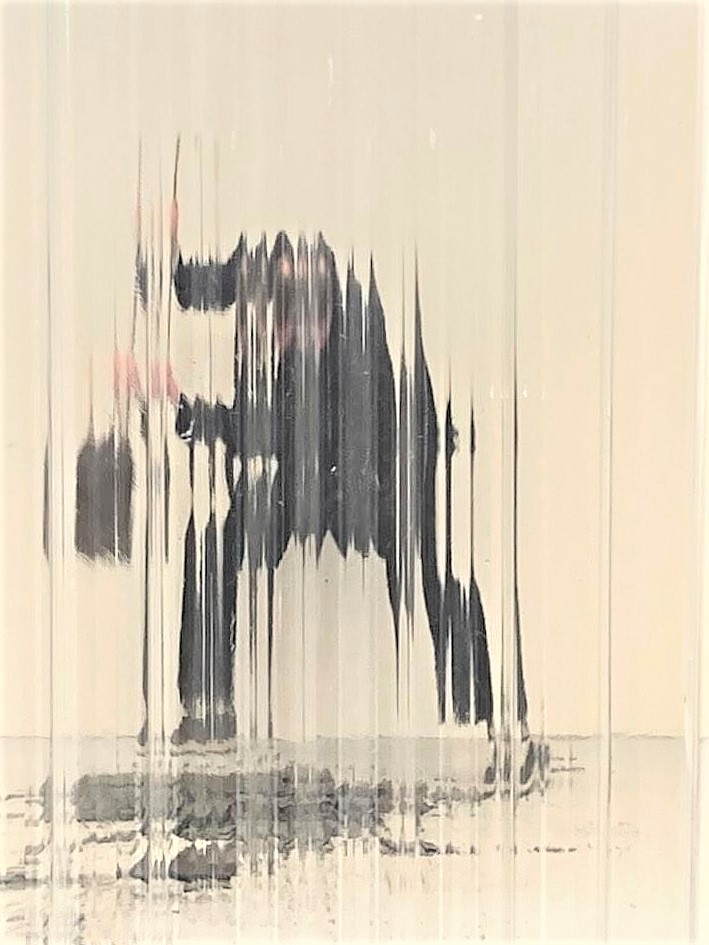“Cancer research is beyond important, it gives people like me a sense of hope” – Markus’ leukaemia story
Markus was shocked when he was diagnosed with the blood cancer chronic lymphocytic leukaemia (CLL) in 2021. Determined to break down barriers and start conversations about cancer, Markus turned to art as a way of sharing his experiences

I was a sprightly 50-year-old with no previous health issues when I was diagnosed with leukaemia out of the blue. I had none of the classic signs – night sweats, bruising, swollen glands.
In fact, it all started when I was bitten by some sort of bug. I just ignored it for a while. Then my wife and I went to visit friends in Edinburgh for a few days. By day two I could not walk. There was a huge amount of pain and swelling around my knee.
Once home I went to the GP believing that the bite had become infected. The doctor suggested a blood test to find out what was going on – and two days later I was called into the surgery and told I may have CLL.
Our research is helping more people survive blood cancer. Please make a regular gift today and support the vital work our scientists are doing to defeat cancer.
It was a complete shock. I had never heard of chronic lymphocytic leukaemia and had no idea what this meant. I instinctively knew it wasn’t good news. For three days I was utterly speechless. I was suddenly confronted by my mortality.
I had asked the doctor to write down the diagnosis and I remember staggering home clutching the piece of paper. It was as if the roof had fallen in on my life. Once home I had to look up CLL on the internet. I was terrified.
‘I was struggling to walk up a flight of stairs’
Once the news of the diagnosis began to sink in two things happened: I felt a strong sense of urgency and the need to get on with stuff. I also felt a sense of responsibility to break down barriers around the fear of cancer, and to talk with others about cancer.
I waited three weeks for further blood tests and investigations. I found these hospital visits traumatic. I wasn’t really aware of what was going on and why.
Initially, I was placed on active monitoring, known as ‘watch and wait’ for about two years – I now refer to that period as ‘watch and wilt’! As time passed, I became a shadow of myself, ashen and struggling to walk up a flight of stairs. I felt exhausted, breathless and drained of all energy. Eventually my consultant suggested I needed to go onto treatment as my white blood cell count was now above 300, when it should have been between one and four.
I was started on intravenous infusions of Obinutuzumab, a targeted treatment, as a day patient and was on this for four months. After the first four weeks of weekly infusions, I started on another targeted drug called Venetoclax. I had nine months of treatment altogether and my blood levels are now thankfully normal. I feel the best I have in about 10 years!
‘My art is inspired by my disease.’
The day I was told I had cancer, I also found out that I had been accepted onto a master's degree course in Fine Art at the University of Brighton, so throughout my ‘watch and wilt’ I was also doing a two-year degree. This was hugely important in helping me deal with all that was going on physically and emotionally.

Image: Markus' artwork Credit: Markus Taylor
I have considered ways in which to represent my disease through creativity. It is a way of reclaiming the narrative and telling my story, rather than allowing experiences to be represented solely as pathology. As a person with cancer, you can be easily swept away by the medical world, this becoming your narrative. My art is my way of empowering myself and expressing that there is a whole person in all that is occurring. It is a way of communicating these ideas to others.
‘I needed to see my cancer.’
I created works using some of my cancerous blood cells. These formed part of my final master's degree exhibition. I had been volunteering as a Patient Educator at Brighton and Sussex Medical School (BSMS), working with students to give them a person-centred understanding of blood cancer, when I was introduced to Professor Chris Pepper, Philips Chair of Experimental Medicine. I was able to collaborate with Professor Pepper, an expert on CLL, and his team of researchers, to achieve my aim of seeing my cancer and ultimately putting it on view to the gallery audience. Working in the laboratory at BSMS we split my blood sample and suspended the cancerous cells inside laboratory flasks. To the naked eye the cells are invisible, but their presence is very real.
I strongly believe in the need for us all to talk openly about cancer. Sharing experiences, knowledge and advice takes away a lot of the fear. I wanted to drag this cancer out of the darkness and into the light, to empower myself.
In my role as Lived Experience Lead for the Sussex Cancer Research Centre, I liaise between scientists and people with cancer. It’s important for scientists to share their work in a way the public can understand.
‘Thanks to cancer research, I am living better and longer.’
Cancer research is beyond important. What it gives people like me is a great sense of hope. I might not understand all the complexities of the science, but even if there is no immediate cure on the horizon for me, knowing that there are people who are passionate about furthering our understanding of cancer gives me hope and positivity.
I also know that thanks to cancer research I am living better and longer. Five years before my treatment I would not have had the targeted drugs I was offered. New advances in treatment are developing quickly so who knows what the future will bring? I have directly benefitted from research, from that process of lab bench work to the drugs entering my body, I understand that I and so many others are here because of the work that has gone on thanks to generous funding.
Over the past three years, Markus has travelled to London to give an annual presentation to students on the MSc in Oncology course at the ICR, as part of the ‘Cancer in Context’ module run by oncologist Dr David Bloomfield. The presentations explore the experiences of those living with cancer.
Find out more about Markus’ work here: https://www.instagram.com/markus__taylor__studio/
.jpg?sfvrsn=e246413_1)